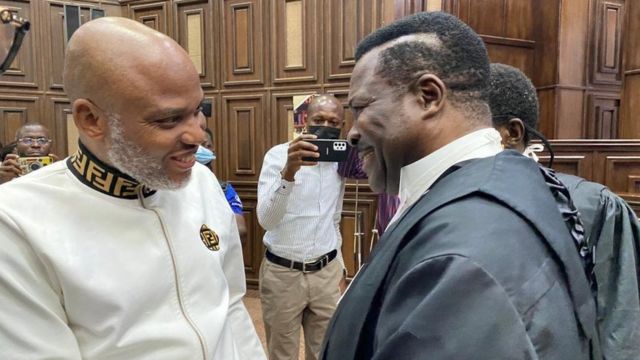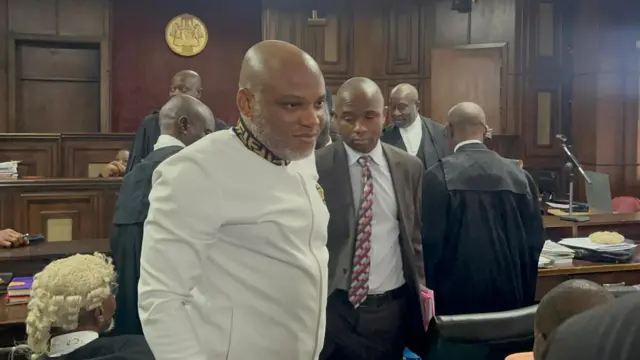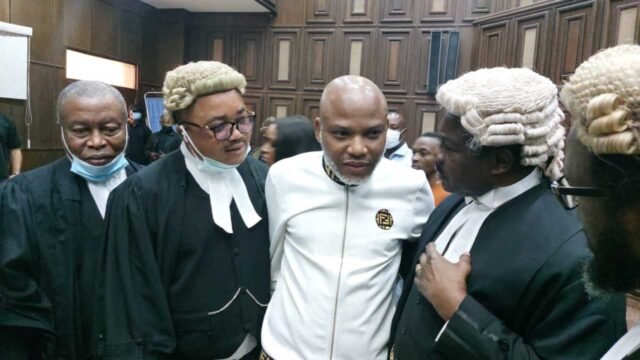In a historic decision that has ignited debate across Africa and the global human rights community, the High Court of Kenya has ruled that the 2021 capture and transfer of Nnamdi Kanu from Nairobi to Abuja was illegal, unconstitutional, and a gross violation of his human rights.
Delivered by Justice E.C. Mwita on June 24, 2025, the judgment not only condemned the actions of the Kenyan and Nigerian governments but awarded Nnamdi Kanu 10 million Kenyan shillings (approximately ₦120 million) in damages. The ruling represents a significant blow to the legal foundations of his ongoing trial in Nigeria and could carry wider implications for international law and extradition protocols across Africa.
Justice Mwita found that the Kenyan government failed in its obligation to protect Nnamdi Kanu, a British citizen who entered Kenya lawfully in June 2021. The judge stated that “the abduction, incommunicado detention, torture, and subsequent forced transfer of Mr. Nnamdi Kanu to Nigeria occurred without due process, violating both Kenyan constitutional guarantees and international human rights conventions.”

Nnamdi Kanu was reportedly taken in broad daylight near Jomo Kenyatta International Airport, held in a secret location, denied legal access, medication, food, and water, and was eventually flown to Nigeria without any formal extradition process. These actions, the court found, amounted to “extraordinary rendition”—a term used to describe illegal state-sponsored transfers of suspects across borders without legal authorization.
The High Court’s ruling has sparked renewed attention on the circumstances surrounding Nnamdi Kanu’s reappearance in Nigeria in June 2021, after months of silence. Many Nigerians and international observers were left stunned at how he was suddenly paraded before a Nigerian court, with no explanation provided for his transfer. The court has now laid bare what many feared: that Nnamdi Kanu’s rights were trampled in what appears to have been a coordinated operation by state agents in both countries.
Justice Mwita ruled unequivocally that “Mr. Kanu’s removal from Kenya was in clear violation of the laws of Kenya, his fundamental freedoms—including security of the person and freedom of movement—and therefore, unconstitutional and illegal.” The court went further to declare that Kenya’s Attorney General must pay compensation on behalf of the government, emphasising the state’s responsibility to uphold justice and the rule of law.
This is not the first time a court has ruled against Nnamdi Kanu’s detention. In 2022, a Nigerian court in Abia State ordered his return to Kenya and awarded him ₦500 million in damages for illegal rendition. However, Nigerian authorities did not comply, and Kanu has remained in detention, facing charges of terrorism.
IPOB Welcomes the Ruling, Vows to Pursue Global Accountability
The Indigenous People of Biafra (IPOB), a movement advocating for the secession of Nigeria’s southeastern region, described the verdict as a major legal and moral victory. In a statement issued by its spokesperson, Emma Powerful, the group said the ruling “has shaken the very foundation of the fraudulent trial against our leader.”
The IPOB insists that what happened to Nnamdi Kanu was not an extradition, but rather a criminal act involving senior members of both governments. “This judgment vindicates our consistent position that what transpired in Nairobi in June 2021 was extraordinary rendition—a criminal act of state-sponsored terrorism involving the highest authorities in Kenya and Nigeria,” the statement read.
The group also extended deep gratitude to its lead counsel in Kenya, Professor PLO Lumumba, for what they described as “brilliant, courageous, and principled legal leadership.” Lumumba, a respected Pan-African legal scholar, has long been involved in high-profile constitutional cases and has now added this milestone to his career.

“We salute the judiciary of Kenya and Hon. Justice E.C. Mwita for standing tall in the face of political pressure and international interference,” IPOB’s statement continued. “His judgment was not only grounded in law but also in the morality and decency that are often missing in politically charged trials.”
For IPOB, the court’s decision has global ramifications. The group has called for a worldwide accountability campaign aimed at holding those involved in Nnamdi Kanu’s rendition responsible. “This is only the beginning. The architects of this crime—from former Presidents Uhuru Kenyatta and Muhammadu Buhari to ex-Attorney General Abubakar Malami—must be brought before international legal bodies.”
Nnamdi Kanu’s ordeal has cast a long shadow over both governments. It also calls into question the role of Western diplomatic missions, particularly the British High Commission, which IPOB accuses of being complicit through silence. Despite Kanu being a British citizen, there was no public statement of protest or formal inquiry by the UK government following his 2021 detention.
“This verdict places a permanent stain on the diplomatic and legal records of both governments,” IPOB noted. “And it sends a warning to authoritarian regimes: the world is watching, and justice will eventually catch up with you.”
As of the time of publication, neither the Kenyan nor Nigerian government had issued an official response to the ruling. However, legal analysts believe this judgment will not be easy to ignore. The awarding of compensation sets a concrete obligation for the Kenyan state, and the strong language used in the ruling could be referenced in future human rights cases.
The decision also adds further weight to calls for Nnamdi Kanu’s immediate release in Nigeria. If his arrest and transfer were illegal, as now affirmed in two separate jurisdictions, many legal experts argue that his ongoing trial in Abuja has no lawful foundation. There are growing demands from local and international rights groups for the Nigerian government to either drop the charges or restart the process legally, this time through recognised extradition frameworks.
Meanwhile, IPOB says it remains committed to a peaceful and legal approach to Biafra’s self-determination. “We are not afraid. We will not be intimidated,” their statement concluded. “This victory belongs to all freedom-loving people around the world.”
For now, Nnamdi Kanu remains in custody in Nigeria. But with this legal triumph in Kenya, the narrative around his detention and trial has shifted sharply. No longer is this merely a matter of national security—it’s now a globally scrutinised human rights case. The spotlight is back on Nairobi and Abuja, and the pressure for accountability is only just beginning.
Join our WhatsApp community
Join Our Social Media Channels:
WhatsApp: NaijaEyes
Facebook: NaijaEyes
Twitter: NaijaEyes
Instagram: NaijaEyes
TikTok: NaijaEyes








































